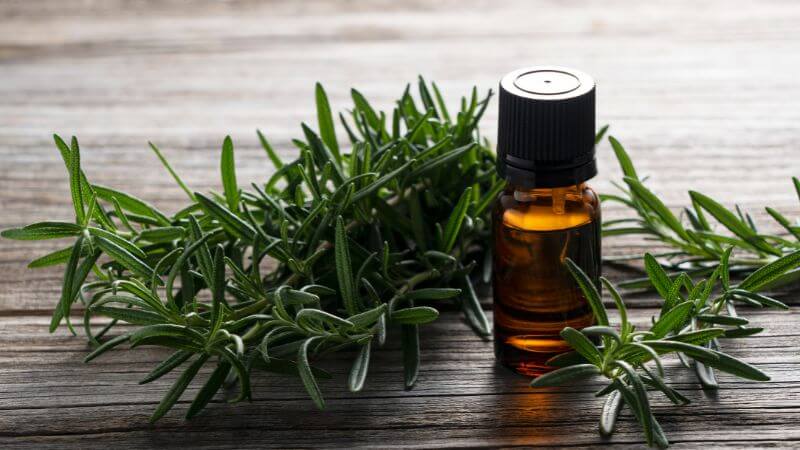Rosemary oil, extracted from rosemary leaves, offers numerous benefits. It promotes hair growth, enhances cognitive function, eases pain, and reduces inflammation. Thus, we bring to you a handy guide on how to make rosemary oil!
But first, let’s look at some benefits of rosemary oil before learning how to make rosemary oil.
Benefits Of Rosemary Oil

Before learning about How To Make Rosemary Oil let us know some benefits of Rosemary Oil:
- Hair Growth and Health: Rosemary oil is often used in hair care products due to its potential to stimulate hair growth, improve hair texture, and reduce dandruff and dryness.
- Improved Cognitive Function: The aroma of rosemary oil has been linked to improved cognitive performance, including enhanced memory, concentration, and mental clarity.
- Pain Relief: Rosemary oil may have analgesic properties, making it useful for relieving headaches, muscle pain, and joint discomfort when used in massage or aromatherapy.
- Anti-Inflammatory: Rosemary oil contains compounds that exhibit anti-inflammatory effects, which could potentially help reduce inflammation and associated symptoms.
- Digestive Support: It might aid digestion by promoting the production of bile, a digestive fluid that helps break down fats.
- Respiratory Health: Inhaling the aroma of rosemary oil might help alleviate respiratory issues like congestion, coughs, and cold symptoms.
- Stress and Anxiety Reduction: The aroma of rosemary oil may have calming effects that help reduce stress, anxiety, and nervous tension when used in aromatherapy.
- Antioxidant Properties: Rosemary oil contains antioxidants that can help protect cells from oxidative stress and damage caused by free radicals.
- Improved Circulation: Massaging with rosemary oil could potentially promote better blood circulation, leading to improved overall cardiovascular health.
- Antimicrobial Effects: Rosemary oil has shown potential antimicrobial properties that might help inhibit the growth of certain bacteria and fungi.
- Skin Care: Due to its antimicrobial and anti-inflammatory properties, rosemary oil is sometimes used to treat acne, reduce skin inflammation, and promote a clearer complexion.
- Pain Management: When diluted and applied topically, rosemary oil might help alleviate muscle and joint pain.
- Support for Arthritis: Some studies suggest that applying rosemary oil topically could provide relief for individuals with arthritis by reducing pain and inflammation.
- Enhanced Immune Function: The antioxidants in rosemary oil could potentially support the immune system by protecting against various infections and diseases.
- Aromatherapy Benefits: The aroma of rosemary oil is invigorating and uplifting, making it a popular choice in aromatherapy to improve mood, increase energy, and enhance overall well-being.
How To Make Rosemary Oil?
How To Make Rosemary Oil with the first method:
Ingredients:
- Fresh rosemary leaves (dried leaves can also be used)
- Carrier oil (such as olive oil, jojoba oil, coconut oil, or grapeseed oil)
Instructions:
- the first step on how to make rosemary oil is to harvest fresh rosemary leaves from a healthy plant. If fresh leaves are not available, you can use dried rosemary leaves instead.
- Choose a clean glass jar with an airtight lid. The size of the jar will depend on how much oil you want to make.
- Gently crush the rosemary leaves to release their natural oils. This helps enhance the infusion process.
- Fill the glass jar about halfway with the crushed rosemary leaves. You can adjust the amount based on your preference and the size of the jar.
- Pour your chosen carrier oil into the jar, covering the rosemary leaves completely. Ensure that the oil level is at least an inch above the leaves.
- Seal the jar with the airtight lid and place it in a cool, dark place. Allow the rosemary leaves to infuse in the oil for about 2 to 4 weeks. This time allows the oil to absorb the beneficial compounds from the rosemary.
- Shake the jar gently every day to help distribute the rosemary’s essential oils throughout the carrier oil.
- After the infusion period, strain the oil through a fine mesh strainer or cheesecloth into a clean glass container. Squeeze out as much oil as possible from the rosemary leaves.
- Store the rosemary-infused oil in a cool, dark place. Make sure the container is tightly sealed. Properly stored, the oil can last for several months. source
How To Make Rosemary Oil With Essential Oil

This is the second method on How To Make Rosemary Oil using essential oil.
- How to make rosemary oil with rosemary essential oil? The answer is simple!
- Select a carrier oil of your choice. Carrier oils are used to dilute essential oils and carry them onto the skin without causing irritation. Olive oil, coconut oil, and jojoba oil are popular choices.
- The recommended dilution for rosemary essential oil is usually around 1-2% for topical use. This means you’ll use 1-2 drops of essential oil per 1 teaspoon (5 mL) of carrier oil. Adjust the dilution according to your preferences and sensitivity.
- Measure the desired amount of carrier oil based on the dilution you’re aiming for. For example, if you’re using 1% dilution, mix 1 drop of rosemary essential oil with 1 teaspoon of carrier oil.
- Add the calculated number of drops of rosemary essential oil to the measured carrier oil. Mix them well together.
- Pour the prepared rosemary oil blend into a dark glass bottle with a tight-fitting cap. Dark glass helps protect the oil from light exposure, which can degrade the oil over time. source
Frequently Asked Questions

How do I make rosemary oil for hair?
To check this recipe click here.
How long does homemade rosemary oil last?
Homemade Rosemary oil will last for about 2 Months.
How long to boil rosemary for hair oil?
15 to 20 minutes on an average.
Can I spray rosemary water on my hair everyday?
Yes, You can apply rosemary water spray for faster hair growth and to reduce hair fall.
What are the side effects of rosemary oil on hair?
Excessive use of Rosemary oil can lead to itching and burning says Holdsworth. Source
Is leaving rosemary oil in hair bad?
Yes, you can leave rosemary oil in your hair overnight.
Is it bad to leave rosemary oil in your hair for 2 days?
If you leave oil more than a day it canclog the pores of your scalp which can result in irritation.
Is it better to boil fresh or dry rosemary for hair growth?
Both is considered safe for hair growth.
Summary!
This is the 2 easy ways on How To Make Rosemary Oil at home. Rosemary oil’s antimicrobial properties aid skincare, while its aroma relieves stress and boosts mood. Hopefully, you found the guide on how to make rosemary oil useful!
Follow Us: Facebook | Instagram | Twitter | Pinterest
Also Read: The Secret of Amazing MICROBLADING FOR EYEBROWS














Leave a Reply